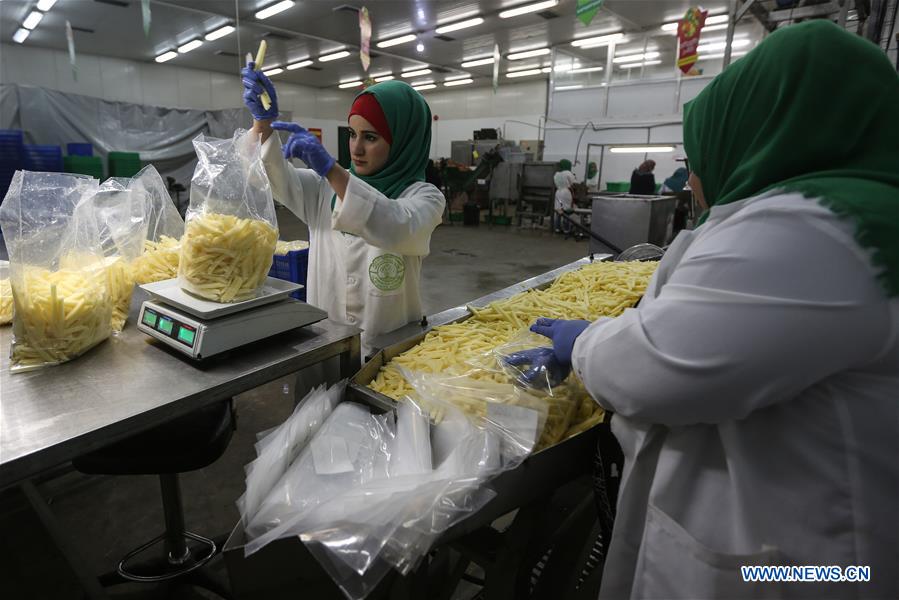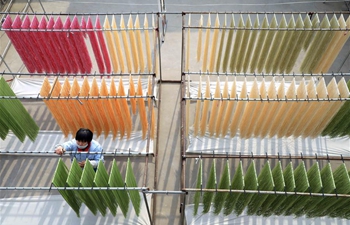
A Palestinian woman weighs French fries at Rosetta factory in the northern Gaza Strip town of Beit Hanoun, on Jan. 30, 2019. The first French fries plant in the Gaza Strip, established under the initiative of the Agricultural Cooperative Society (ACS), provided rare employment opportunities for women, especially young graduates, and helped the farmers with the surplus of potato harvest. (Xinhua/Stringer)
GAZA, Feb. 6 (Xinhua) -- The first French fries plant in the Gaza Strip provided rare employment opportunities for women, especially young graduates, and helped the farmers with the surplus of potato harvest.
Rosetta factory was established under the initiative of the Agricultural Cooperative Society (ACS) in the northern Gaza Strip town of Beit Hanoun.
According to the ACS, the initiative aims at empowering women economically through special employment opportunities, especially for female graduates in Gaza.
"I work on the potato cleaning machine and the job help me improve my family's income," Rahifa Hamad, a 24-year-old mother of a child and a graduate of mathematics, told Xinhua.
"I suffered from unemployment after graduation, but later found a suitable opportunity to join the factory to help my unemployed husband," she said, adding that the average salary of female and male workers in the factory is around 12 U.S. dollars per day.
According to the Palestinian Central Bureau of Statistics, 61 percent of young graduates in the Gaza Strip are unemployed, and 37 percent of male graduates don't have a job, while 72 percent of female graduates are jobless.
The World Bank said in a recent report that unemployment among Palestinians in the Gaza Strip hit 70 percent.
The food industry engineer and project supervisor Riham Madhoun said the factory initially provides 10 job opportunities for women and young graduates, but they plan to expand the work crew once production is increased.
The factory, which produces around one ton of French fries every day, also hires around 10 men who work on night shifts when more shipments are demanded.
The number of working days in the factory ranges from 15 to 20 working days per month, depending on shipment demand as well as the daily electricity schedule that Gaza has been adopting to deal with the power crisis which has been ongoing for more than 13 years.
"The problem of power outages seriously affects the work of the factory. When there is a power cut, generators are used," al-Madhoun said, adding that the factory needs electricity to store the potatoes in special refrigerators during the whole day.
She explained that after testing 16 types of imported potatoes, three were adopted to be planted in the town of Beit Hanoun.
"The harvest of these three species of potatoes led to the start of the plant last June," she added.
Madhoun said the aim of the factory was also to support the farmers and use the surplus of potato harvest, in addition to balancing the consumption of imported frozen French fries.
According to the Ministry of Agriculture in Gaza, 13,000 dunams are planted with potatoes in the coastal enclave, producing about 55,000 tons annually and 3,000 tons are exported.
Madhoun explained the quantities of potatoes are stored in special refrigerators and used in the manufacturing of ready-made French potatoes, which are sold to restaurants in the coastal enclave.
Due to the increase production of new types of potatoes and the lack of freezing machines at the factory, two shipments were exported to Kuwait recently.
The factory will produce frozen potatoes within two months after the arrival of fast freezing machines, the engineer said.
Madhoun expressed hope that this will help double both the production and women labor force of the factory.
Gaza Chamber of Commerce and Industry warned in a recent report that the Gaza Strip is unable to create new jobs in light of the high poverty and unemployment rates among its two million populations.
The report said the private sector in Gaza is unable to provide any new job opportunities, and there are also no new jobs in the public sector in light of the continued internal political division and the failure to achieve national reconciliation.
Salary cuts of government employees, which reached 50 percent of salaries and have been ongoing for almost two years, made things even worse.
A local Gaza-based committee resisting the 12-year Israeli blockade warned in January that Israel's embargo has led to a severe humanitarian deterioration in all aspects of life in the Gaza Strip.
The committee said that 90 percent of factories in the impoverished densely populated territory have been badly damaged due to the Israeli blockade and the growing rates of unemployment, adding that 85 percent of the populations are living under the poverty line.















